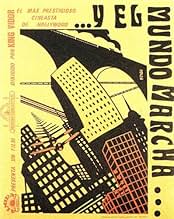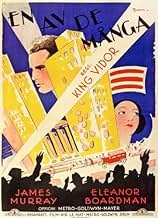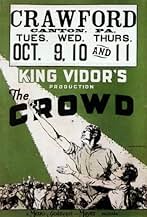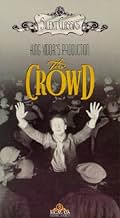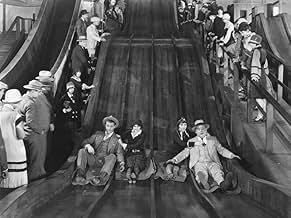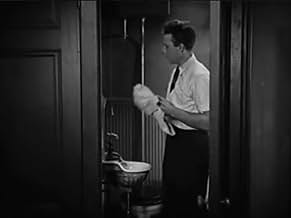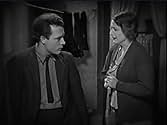IMDb RATING
8.0/10
9.7K
YOUR RATING
The life of a man and woman together in a large, impersonal metropolis through their hopes, struggles, and downfalls.The life of a man and woman together in a large, impersonal metropolis through their hopes, struggles, and downfalls.The life of a man and woman together in a large, impersonal metropolis through their hopes, struggles, and downfalls.
- Nominated for 2 Oscars
- 4 wins & 2 nominations total
John D. Bloss
- Boy on Fence
- (uncredited)
Roy Bloss
- Boy on Fence
- (uncredited)
Sidney Bracey
- John's Supervisor
- (uncredited)
Johnny Downs
- John - Age 12
- (uncredited)
Sally Eilers
- Party Girl at Bert's Place
- (uncredited)
Joseph W. Girard
- Member of Board of Directors
- (uncredited)
Pat Harmon
- Truck Driver
- (uncredited)
Chris-Pin Martin
- Worker in Hallway
- (uncredited)
Claude Payton
- Undetermined Secondary Role
- (uncredited)
Featured reviews
The most remarkable thing about 'The Crowd (1928)' is that is manages to cover so much emotional ground. John (James Murray) is a young man who knew from an early age that he would become somebody special, that he would stand out from the crowd. At age 21, he travels to New York, the towering metropolis introduced via a montage of impressive high- angled shots that resemble Robert Florey's 'Skyscraper Symphony (1929).' John joins the accounting sector of a large insurance firm, and studiously assures himself that he need only work his way up. Years pass. John marries, has two children. It takes him five years to realise that he has become what he swore never to become: a member of The Crowd.
Vidor's message is a double-edged sword. Early in the film, The Crowd is something to be loathed: the camera, in a virtuoso display of technical brilliance, swoops down upon a seemingly-endless room of seated accountants, each man turning pages in mechanical unison. (Billy Wilder later paid homage to this scene in 'The Apartment (1960)'). But when John finally determines to break free from The Crowd, his world falls apart around him – he can't maintain a job, his wife threatens to leave him, he loses his dignity. The film's ending is intriguing in its ambiguity: John is absorbed into the crowds of a laughing theatre audience.
Is it a happy ending, an embracing of conformity? Is it ironic, an acknowledgment of mass delusion? Is Vidor integrating his character into the cinema audience? In 'The Bicycle Thief (1948),' a similar disappearance into the crowd is viewed as tragic, but here I'm not so sure. F.W. Murnau's 'The Last Laugh (1924)' told a similar tale, depicting the bleak prospects of a working-class doorman, played by Emil Jannings. UFA studio thwarted that film by enforcing a ludicrous happy ending that Murnau included only with a snide introductory title card. M-G-M also toyed with a happy ending to 'The Crowd,' but fortunately Vidor's version ultimately won out, a conclusion genuinely unsettling in its uncertainty, and sure to inspire discussion.
Vidor's message is a double-edged sword. Early in the film, The Crowd is something to be loathed: the camera, in a virtuoso display of technical brilliance, swoops down upon a seemingly-endless room of seated accountants, each man turning pages in mechanical unison. (Billy Wilder later paid homage to this scene in 'The Apartment (1960)'). But when John finally determines to break free from The Crowd, his world falls apart around him – he can't maintain a job, his wife threatens to leave him, he loses his dignity. The film's ending is intriguing in its ambiguity: John is absorbed into the crowds of a laughing theatre audience.
Is it a happy ending, an embracing of conformity? Is it ironic, an acknowledgment of mass delusion? Is Vidor integrating his character into the cinema audience? In 'The Bicycle Thief (1948),' a similar disappearance into the crowd is viewed as tragic, but here I'm not so sure. F.W. Murnau's 'The Last Laugh (1924)' told a similar tale, depicting the bleak prospects of a working-class doorman, played by Emil Jannings. UFA studio thwarted that film by enforcing a ludicrous happy ending that Murnau included only with a snide introductory title card. M-G-M also toyed with a happy ending to 'The Crowd,' but fortunately Vidor's version ultimately won out, a conclusion genuinely unsettling in its uncertainty, and sure to inspire discussion.
Like most of the silent tragedies I've seen (and there haven't been many), "The Crowd" was hard to like. That didn't stop it from being a finely directed and acted drama. Like any film from any era that avoids the traps of trend-conscious filmmaking, "The Crowd" was built to last. When you make a movie with a good, solid story and inspire the cast to give brilliant performances, it's difficult to go wrong.
It's not a fun movie -- most of the time we're spent watching James Murray shoot himself in the foot, scene after scene. He's a really pathetic creature, but the director, King Vidor, portrays him and his story without passing judgment.
Worth the price of admission alone, Vidor's eye for detail in old New York City. In a justly famous montage and tracking shot near the beginning, he shows us Gotham so well, and in such great detail, that hardly a director since has been able to match him. His nomination of Best Director at the first Academy Awards was completely deserved (and his loss to Frank Borzage for the creaky "7th Heaven" was, arguably, the first of Oscar's major blunders.)
It's a bleak world view, that's for sure, but it keeps your attention and fills your eye.
It's not a fun movie -- most of the time we're spent watching James Murray shoot himself in the foot, scene after scene. He's a really pathetic creature, but the director, King Vidor, portrays him and his story without passing judgment.
Worth the price of admission alone, Vidor's eye for detail in old New York City. In a justly famous montage and tracking shot near the beginning, he shows us Gotham so well, and in such great detail, that hardly a director since has been able to match him. His nomination of Best Director at the first Academy Awards was completely deserved (and his loss to Frank Borzage for the creaky "7th Heaven" was, arguably, the first of Oscar's major blunders.)
It's a bleak world view, that's for sure, but it keeps your attention and fills your eye.
This has to be w/ out a doubt my favorite film of all time (althought Metropolis is a very close second). What King Vidor brought to the silver screen when he made this film was pure genius. Few films compare to this one. The Techniques used are way ahead of their time and reminiscent of few directors before him. Not even Griffith could obtain such amazing crowd footage as Vidor did. The story line is one that we can still relate to today, wanting to achieve our dreams but just falling short. Today it's called depression or something of the sort but then in an age of new development it was different. Not being able to achieve greatness wasn't uncommon but it felt that way. And the character in this film is no exception, I truly recommend this film to anyone who doesn't mind a good drama and to anyone who wants to see what life was like in the late 1920's.
Restored with a very nice score,"the crowd" hasn't aged a bit.The topic is as relevant today as it was in 1928.Do have a look at the first pictures of "the apartment" (1960) or the last ones of "working girl"(1988)and you'll know what I mean. John Sims tries to beat the crowd,this crowd that follows him everywhere,at work,in the streets,at the fair or on the beach.He doesn't even realize his condition :you should see him laughing at the people on the street,behaving like sheep.It's always someone else,his wife says,take a look at yourself.
The secondary characters are wonderfully depicted:the well-padded buddy,the mother and brothers-in-law always contemptuous,always putting John down.Lots of sequences are memorable,now comic,now tragic:the tiny flat where even the bed must be folded,the huge office where employees are doing the same job at the same time,where everybody acts alike when they leave their job,like some kind of ballet.
John Sims is the embodiment of the American dream,but it has an universal appeal.When he was born,his father promised he would have good prospects,he would become someone big.King Vidor does not show the relationship father/son cause the father disappears when John is still a boy,but we can easily imagine it.So Sims thought NY was depending on him,and he discovers that he will be a wash-out all his life.If it weren't for his little boy who still believes in him(Vittorio de Sica will remember it for his "bicycle thief",he would throw himself under a train.
The cinematography is prodigious;two examples : The father is dead, the boy is climbing a stair : stunning high angle shot,enhancing his awful pain. On the contrary,the skyscrapers are filmed from below,showing how lost a human being can feel in this steel and glass world .
A detail :the hysterical/historical joke at the fair will be used again by the Beatles themselves in their "magical mystery tour" home-made movie.
1928:the silent era was coming to an end but we had not heard the last of it.
The secondary characters are wonderfully depicted:the well-padded buddy,the mother and brothers-in-law always contemptuous,always putting John down.Lots of sequences are memorable,now comic,now tragic:the tiny flat where even the bed must be folded,the huge office where employees are doing the same job at the same time,where everybody acts alike when they leave their job,like some kind of ballet.
John Sims is the embodiment of the American dream,but it has an universal appeal.When he was born,his father promised he would have good prospects,he would become someone big.King Vidor does not show the relationship father/son cause the father disappears when John is still a boy,but we can easily imagine it.So Sims thought NY was depending on him,and he discovers that he will be a wash-out all his life.If it weren't for his little boy who still believes in him(Vittorio de Sica will remember it for his "bicycle thief",he would throw himself under a train.
The cinematography is prodigious;two examples : The father is dead, the boy is climbing a stair : stunning high angle shot,enhancing his awful pain. On the contrary,the skyscrapers are filmed from below,showing how lost a human being can feel in this steel and glass world .
A detail :the hysterical/historical joke at the fair will be used again by the Beatles themselves in their "magical mystery tour" home-made movie.
1928:the silent era was coming to an end but we had not heard the last of it.
This wonderful silent movie depicts the individual who gets swallowed up by the uniformity of society yet also represents the yearnings and aspirations for the want of a better life. Our main character is forever waiting for his ship to come in and sadly it never does. King Vidors sweeping shot of the rows and rows of desks and the image of John being a faceless number in the crowd. Despite him thinking that he is better than others and it's only a matter of time before his situation improves. It sadly never does and he loses the respect of his wife. Perhaps if there is a moral to this movie, then it should be that life can be a bitter pill to swallow but we should take pleasure in the small things in life and recognise that we have to accept lifes disappointments which will inevitably occur. Don't let the year that the film was made put you off or it being in black and white. This movie will grab you by the throat and won't let go. A classic!
Did you know
- TriviaSeveral years after the film was made, alcoholism had taken its toll on lead actor James Murray, who was reduced to panhandling in the street. Ironically, one of the passers-by he solicited for money turned out to be King Vidor, who offered him a part in the film's semi-sequel, Notre pain quotidien (1934). Murray declined the offer, thinking it was only made out of pity. He died in 1936 at the age of 35 in a drowning incident. Vidor was sufficiently compelled to write his life story as an unrealized screenplay, which he called "The Actor".
- GoofsAfter John sprays himself with milk when opening the bottle, his clothes go from covered with milk to clean from one shot to the next.
- Quotes
Title Card: The crowd laughs with you always... but it will cry with you for only a day.
- Alternate versionsThere is an Italian edition of this film on DVD, distributed by DNA srl, "LA FOLLA (1928) + LA GRANDE PARATA (1925)" (2 Films on a single DVD), re-edited with the contribution of film historian Riccardo Cusin. This version is also available for streaming on some platforms.
- ConnectionsEdited into Quand on est belle (1931)
- How long is The Crowd?Powered by Alexa
Details
- Release date
- Country of origin
- Language
- Also known as
- The Crowd
- Filming locations
- Coney Island, Brooklyn, New York City, New York, USA(nighttime establishing exterior shots)
- Production company
- See more company credits at IMDbPro
- Runtime1 hour 38 minutes
- Color
- Sound mix
- Aspect ratio
- 1.33 : 1
Contribute to this page
Suggest an edit or add missing content


